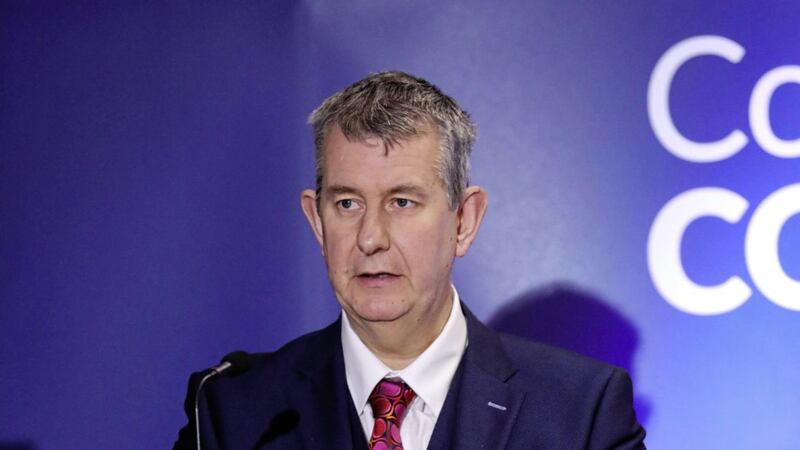It is as irresponsible for DUP ministers to make solo-run statements on lifting the lockdown as it was for Sinn Féin ministers to do the same on entering it.
There are ways for the executive to handle differences of opinion, including new mechanisms under the New Decade, New Approach deal. Musing to the media is not one of them.
At least Sinn Féin’s main solo run was only about schools, whose closure appears to be of marginal effect. The DUP has reopened graveyards and agriculture minister Edwin Poots says churches could operate under limited circumstances.
Research from the United States shows funerals and religious services can be ‘super spreader’ events. Poots has a far better case on reopening garden centres - but he should be making it to his colleagues, not to the public.
**
With the Republic conducting its own lockdown exit debate, business groups on both sides of the border have written to Stormont and the Irish government calling for “cooperation, coordination and joined-up thinking”.
This is an increasingly common call and it is apparently necessary to point out that unionists have always agreed with it - and said so. It was Dublin that set aside plans and presumptions of all-Ireland cooperation by unilaterally announcing school closures.
Although UUP health minister Robin Swann announced this week that Northern Ireland could exit lockdown at a different pace to the rest of the UK, unionists are still being accused of following Britain through stupidity or worse. Some of this criticism strays close to saying Protestants spread the plague. We have enough 17th century prejudice without reverting to the middle ages.
**
The limits of science as a crutch to politics are about to be exposed as face masks become the next coronavirus debate. The SDLP wants Stormont to adopt the Scottish government’s recommendation that people wear masks in enclosed spaces. However, the Scottish government’s own chief medical adviser told it “the global evidence” is that “masks in the general population don’t work”. The World Health Organisation agrees, while its EU counterpart disagrees. The UK government’s advice is that there is “weak evidence” masks work. The Irish government, in what sounds like surrender, says whatever it decides will not be compulsory. Stormont’s advice is that any benefit of masks might be offset by complacency. One danger of all this politics is that wearing or not wearing a mask could become a unionist or nationalist signifier - the epidemic equivalent of a Rangers of Celtic top.
**
The Department of Health still cannot get its coronavirus ‘digital dashboard’ to work, two weeks after its formal launch. Despite the name there are no fancy graphics to explain the problem. The dashboard is just a simple web page where the various statistics already published elsewhere are to be uploaded every day. This is a task 14-year-olds are meant to be capable of under the Northern Ireland curriculum. Did the civil service’s early retirement scheme get a little out of hand?
In 2016, when the Stormont executive last agreed a draft programme for government, it was heralded as a breakthrough in accountability because it grouped policies under 33 ‘indicators’, which the public could use to judge delivery via a “government dashboard” website. One year later, under indirect rule, the civil service republished the programme without any mention of indicators. In fairness, that was really more of a GCSE project.
**
The dashboard fiasco means it is no surprise supermarkets in Northern Ireland still do not have access to the list of people required to self-isolate, so it can prioritise them for delivery slots. The UK government handed NHS data over to retailers in England a month ago, with the devolved administrations in Scotland and Wales following closely behind. Here, it was declared difficult due to databases being spread across the departments of health and communities, although this should be a trivial technical challenge. Officials and ministers now admit their concern is data protection, yet the law on that is the same across the UK. The degree of administrative cowardice this implies is pathetic. Nothing anybody at Stormont is being expected to do would be an offence under data protection legislation, as long as there was no attempt to cover it up. A meaningless scolding is the worst that could happen.
**
As Fianna Fáil and Fine Gael try wooing the Greens into government, it seems to be escaping attention that this is an all-Ireland issue. The Northern Ireland Green Party holds the remarkable distinction of being a separate party in the UK and a region of the Green Party of Ireland. Its members are about a quarter of the Irish Greens by number and attend conferences on an equal footing. A special conference is required to enter a Dublin coalition and subsequent annual conferences will be important to any coalition’s survival. Key votes need to pass by 66 per cent.
The upshot of all this is that even without Sinn Féin, Fianna Fáil and Fine Gael face an occasional northern veto.









